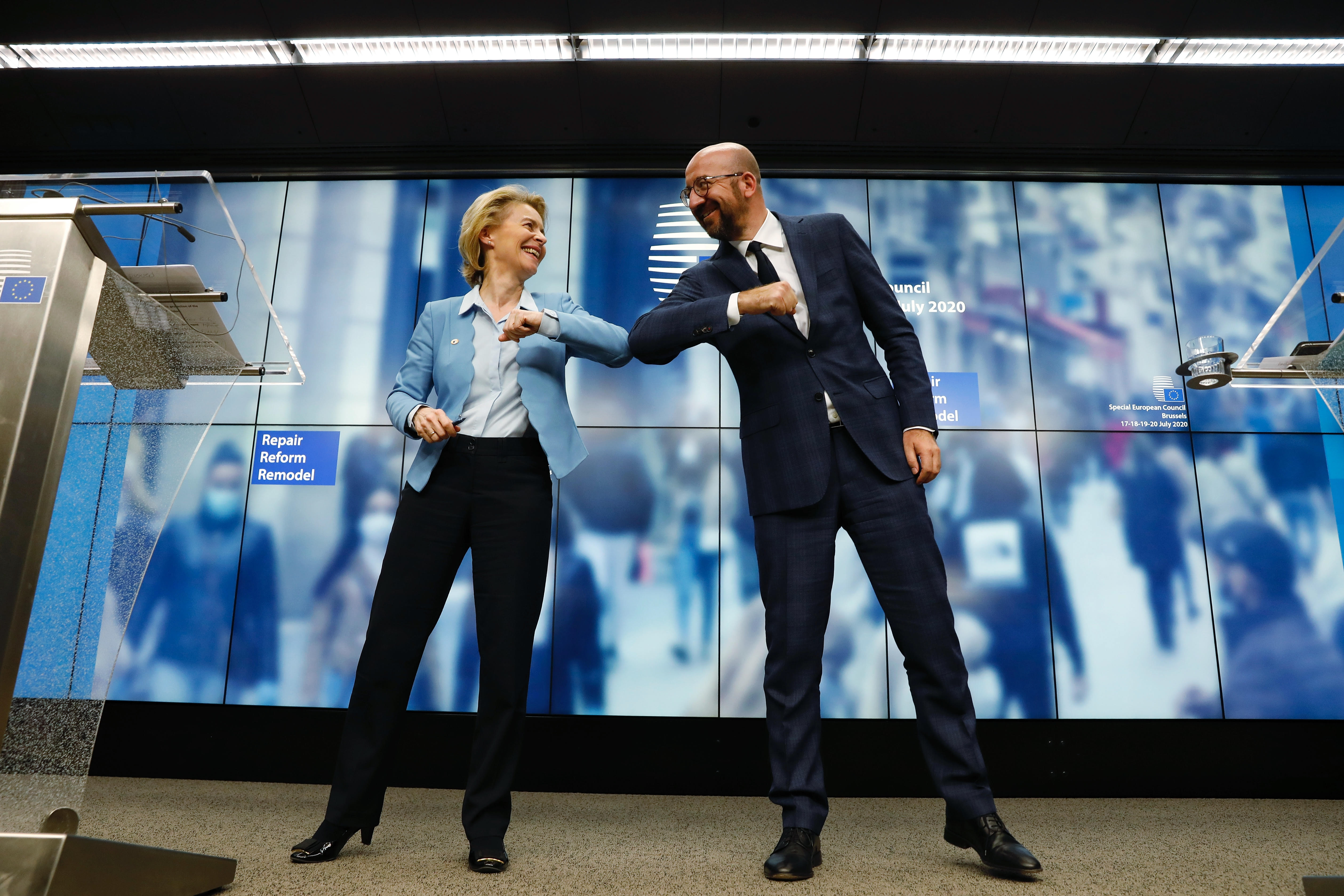
European Council President Charles Michel (R) and European Commission President Ursula von der Leyen attend a press conference after a special EU summit in Brussels, Belgium, July 21, 2020. (European Union/Handout via Xinhua)
--Following intense marathon negotiations, leaders of the 27-member EU Tuesday reached a consensus on a 750 billion-euro coronavirus crisis recovery fund and the bloc's long-term budget worth over 1 trillion euros.
-- European Central Bank President Christine Lagarde said the deal shows the EU member states come together to help the people of Europe.
-- The market responded positively, with the euro marking a fresh four-month high and commodity currencies found support on Tuesday after the recovery plan was clinched.
BRUSSELS, July 21 (Xinhua) -- Following intense marathon negotiations, leaders of the 27 European Union member states on Tuesday morning reached a consensus on the 750 billion-euro coronavirus crisis recovery fund and the bloc's long-term budget worth over 1 trillion euros.
"We did it," European Council President and host of the summit Charles Michel said earlier Tuesday in a press conference with European Commission President Ursula von der Leyen, after talks over the night. He hailed the agreement as a historic moment.
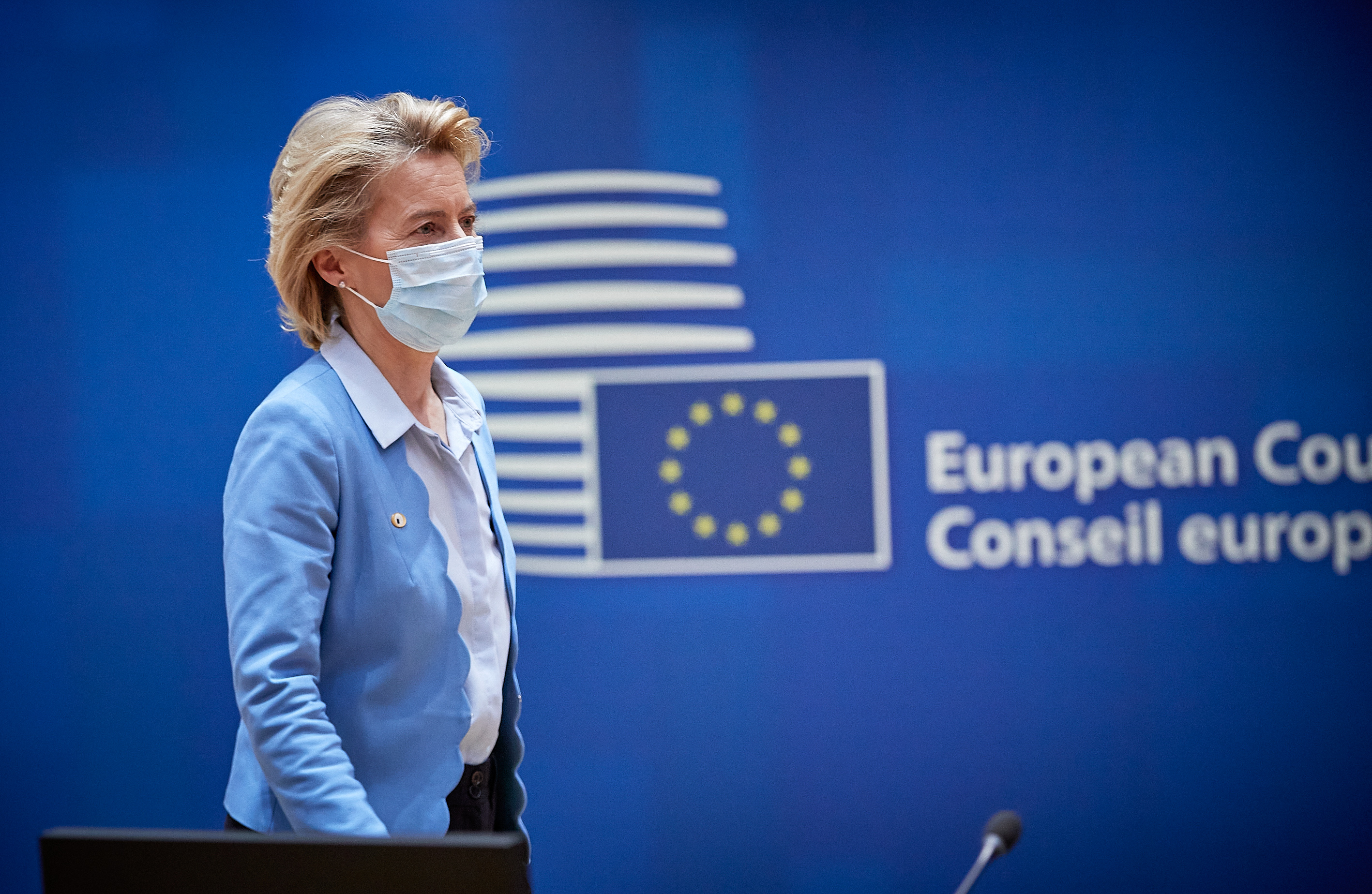
European Commission President Ursula von der Leyen arrives for a special EU summit in Brussels, Belgium, July 20, 2020. (European Union/Handout via Xinhua)
Von der Leyen said the EU is often accused of doing "too little, too late" but that charge can't hold water this time. "We negotiated (for) four long days and nights, more than 90 hours," but it was worth it, she said.
The prolonged summit showed how difficult the negotiations were, as widely expected. The size of the recovery fund, how it should be managed and issues regarding the rule of law were key points for the negotiations.
The recovery plan came amid the unprecedented crisis the EU is suffering due to the COVID-19 pandemic. The European Commission said earlier this month that the EU economy is forecast to contract by 8.3 percent this year and grow by 5.8 percent in 2021.
In the joint press conference with German Chancellor Angela Merkel, French President Emmanuel Macron said it was a "historic day for Europe," while Merkel said that she was "very happy" with the deal and "relieved" that the deal was reached.

French President Emmanuel Macron (L) and German Chancellor Angela Merkel prepare to attend a special EU summit in Brussels, Belgium, July 20, 2020. (European Union/Handout via Xinhua)
The special summit was the first face-to-face one since the pandemic spread across the globe in March. It was originally scheduled to end last Friday and Saturday, but the great differences among member states pushed the summit to Tuesday.
KEY FACTS
According to the final conclusions, the debt-financed recovery fund comprises 390 billion euros in non-repayable grants and 360 billion euros in loans to member states, while the EU Commission's original proposal of the fund consisted of 500 billion euros in grants and 250 billion euros in loans.
Seventy percent of the recovery fund should be used in 2021-2022. Another 30 percent can be used in 2023. The repayment of the pan-European debt under this fund should be completed by Dec. 31, 2058.
Denmark, the Netherlands, Austria and Sweden, nicknamed "Frugal Four," had previously opposed giving non-repayable grants to countries among the hardest hit by the pandemic-triggered crisis, especially Italy and Spain.
Led by Dutch Prime Minister Mark Rutte, the frugal countries insisted on providing aid with loans and linking aid to reform, but the virus-hit countries needed cash aid as soon as possible.
The frugal countries later made a compromise to accept grants, and other countries agreed to lower the proportion of the grants time and again. The proportion of the loans and grants was one of the key focuses during the negotiations.

Austrian Chancellor Sebastian Kurz arrives for a special EU summit in Brussels, Belgium, July 20, 2020. (European Union/Handout via Xinhua)
The final plan is also a compromise for Poland and Hungary as the two countries opposed linking the recovery fund to complying with the rule of law. Measures against democratic backsliding require a qualified majority of member states.
The long-term EU budget for 2021-2027, or the so-called multiannual financial framework (MMF), was set at 1.0743 trillion euros, preserving the previously announced volume.
The "Frugal Four" will be granted higher budget rebates compared with a pre-summit version of the budget proposal, seen as part of the concessions made by the council.
Germany, another net donor of the EU budget, will also receive a budget rebate, but the amount was unchanged from the earlier version of the proposed budget.
According to the plan, a mechanism will be created to help member states with their transition to low-carbon economies. Meanwhile, climate neutrality by 2050 at the national level is no longer a must for countries like Poland to gain access to the fund, but prerequisites including proportionate emission reduction are emphasized.

European Council President Charles Michel (L) talks with Danish Prime Minister Mette Frederiksen ahead of a special EU summit in Brussels, Belgium, July 20, 2020. (European Union/Handout via Xinhua)
OPTIMISM, PRUDENCE
All EU leaders and heavyweights hailed the final agreement. Spanish Prime Minister Pedro Sanchez called it a great agreement for both EU and Spain. "The agenda of the European Union and the agenda of Spain are in absolute synchrony."
European Central Bank President Christine Lagarde said the deal shows the EU member states come together to help the people of Europe.
"Thank you for your resilience and determined action over the last days. We can only fight the economic consequences of COVID-19 by working together," Lagarde wrote on Twitter.
Rutte said that the outcome was within the Netherlands' red lines. while Italian Prime Minister Giuseppe Conte, Rutte's major opponent in the negotiations, said the deal was a historic one for his country and the EU.
Volker Perthes, director of the Berlin-based German Institute for International and Security Affairs, told Xinhua that the pandemic pushed the EU to elicit major steps towards further integration, such as the economic recovery fund.
Perthes said that once the recovery fund is clinched, it would be a major move forward in terms of European solidarity.
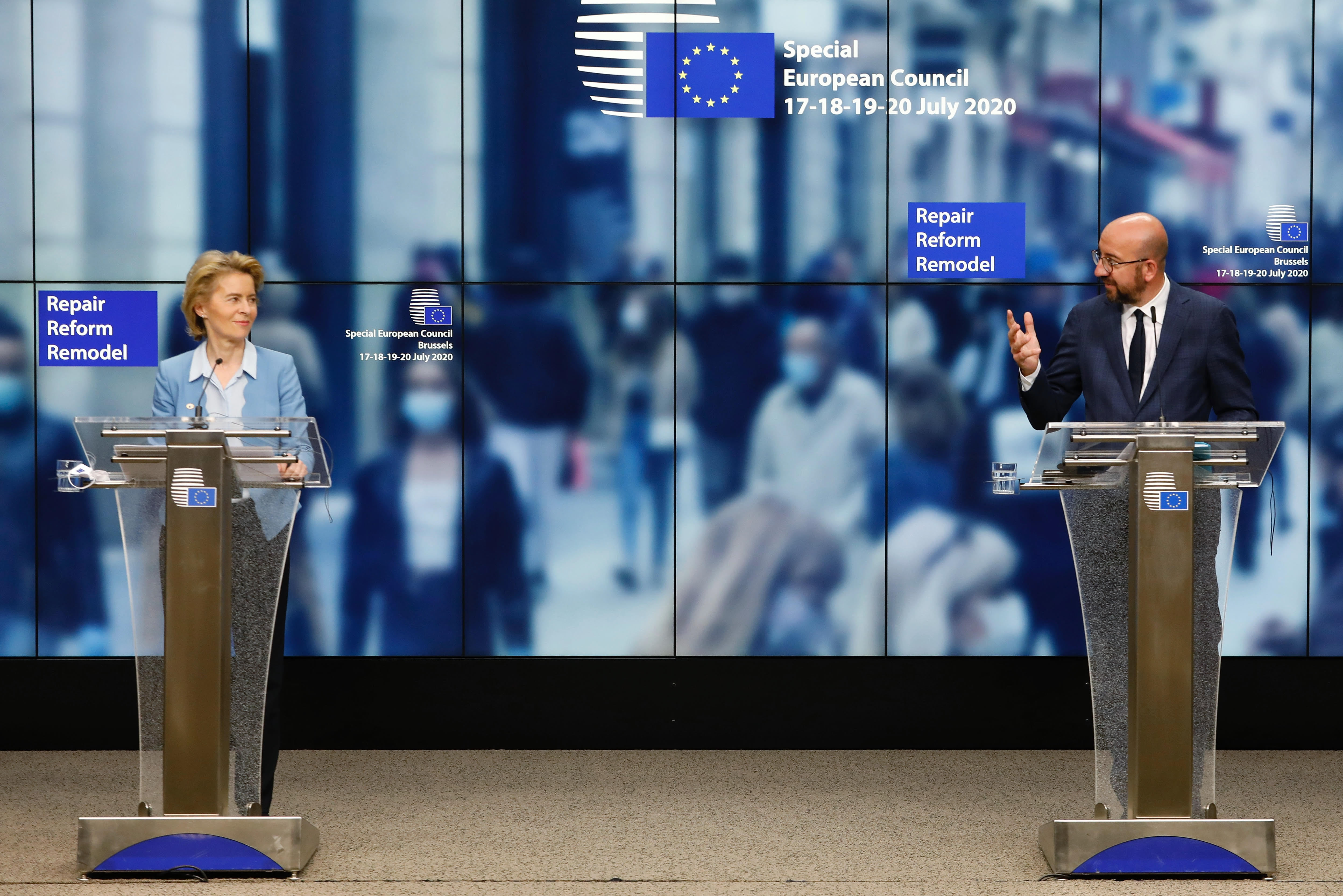
European Council President Charles Michel (R) and European Commission President Ursula von der Leyen attend a press conference after a special EU summit in Brussels, Belgium, July 21, 2020. (European Union/Handout via Xinhua)
The market responded positively, with the euro marking a fresh four-month high and commodity currencies found support on Tuesday after the recovery plan was clinched.
The hard-won deal pushed the euro 0.2 percent higher to 1.1470 against the U.S. dollar, its strongest since early March, although it soon retreated back to just below flat since the agreement was widely expected.
Nevertheless, the proposed budget and recovery fund had drawn criticism among experts even before the summit convened. Gabriel Felbermayr, president of the Kiel Institute for the World Economy, said earlier that the money for crisis management would arrive too late for the member states.
Felbermayr added that the EU needs a permanent automatic stabilization mechanism to prepare for the next crisis. "There is a risk that the EU will react too late in the next crisis," Felbermayr said.
The four-day marathon negotiations also raised concern over the so-called German-Franco Axis in the European integration process, as the recovery fund initially proposed by Germany and France encountered fierce opposition from smaller states.
COVID-19 recovery funding was expected to be tied to democratic values and the rule of law. The Visegrad countries of the Czech Republic, Slovakia, Poland and Hungary, were widely opposed to such conditions. The group wrote on Twitter that the EU meeting watered down rule of law to a mere sentence, illustrating how the Visegrad Four, and in particular Polish Prime Minister Mateusz Morawiecki and Hungarian Prime Minister Viktor Orban, are becoming major European players.
A commentary carried by German Focus Online said that the summit revealed "a fundamental paradigm shift in the European power structure."
"The model of France and Germany leading doesn't work and new constellations have formed," it said.

















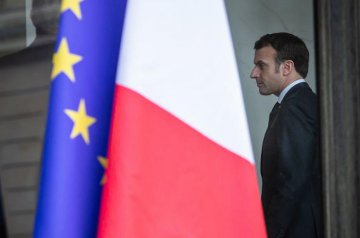
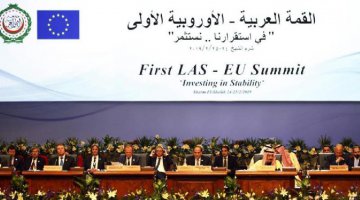


Latest comments